
Is self-care selfish?
Many people wonder—sometimes out loud, sometimes in the quiet moments after making themselves the lowest priority. I hear it at the studio all the time: “Shouldn’t I put everyone else ahead of myself?” It’s a noble impulse, but one that needs a little perspective shift.
Here’s my favorite illustration:
At the start of every flight, flight attendants remind you that, if needed, oxygen masks will drop down. Put your own mask on first before helping anyone else.
Why? Because if you can’t breathe, you can’t help anyone sitting next to you.
In the same way, if you don’t consistently take care of your health—through exercise, good nutrition, enough rest, and stress management—your ability to show up as loving, supportive, and present for others quickly starts to break down.
Practicing Self-Care Is an Act of Love
Contrary to the old narrative, taking care of yourself is actually one of the best things you can do for the people around you. Here’s why:
- You’re at your best when you care for yourself first. When you’re well-rested, nourished, and managing your stress, you’re more patient, more insightful, more giving, and more fun to be around.
- Self-care prevents burnout and resentment. Overextending yourself can lead to fatigue, frustration, and even chronic health issues—all of which take a toll not just on you, but on your loved ones, too.
- You set a healthy example. By prioritizing your own well-being, you give others permission to do the same, modeling self-respect and life balance for kids, friends, and partners alike.
Consider the Opposite
How do you show up for others when you’re exhausted, stressed, or drained?
- Are you as patient with your kids or partner?
- Do you offer the kind of empathy or support you wish you could?
- Or do you find yourself irritable, distant, or snapping at minor frustrations?
Most of us know the answer. You can only give what you have. If your cup is empty, there’s little left to pour for anyone else.
The Science and Psychology: Why Self-Care Isn’t Selfish
- Self-care increases energy, reduces stress, and improves mood. Studies show that caring for your health and mental well-being (through regular movement, restorative rest, and stress management) makes you a more effective, patient, and loving friend, parent, or partner.
- Healthy boundaries lead to stronger relationships. When you make time for yourself and honor your limits, you enter relationships as a whole person—not as a martyr running on empty.
- Self-care supports resilience in challenging times. Caregivers, in particular, are urged by health experts to tend to their own needs precisely because doing so allows them to remain balanced and effective, benefitting everyone involved.
How to Practice Everyday Self-Care (and Why It Benefits Everyone)
- Exercise regularly. Not only does it enhance your own strength and mood, but it helps you manage the demands placed on you by others.
- Eat balanced meals and hydrate. Your physical energy and emotional bandwidth rise when you’re well nourished.
- Prioritize quality sleep. Fatigue affects communication, patience, and decision-making.
- Schedule downtime and hobbies. Joyful activities replenish your reserves—and remind others to value “recharge” time, too.
- Treat yourself with the same compassion you offer others. You’re modeling emotional intelligence and psychological health for everyone you love.
Client Example: When Self-Care Changes Everything
Years ago, I worked with a client, Tania, who felt intense guilt each time she scheduled time for fitness, because her family “needed her every minute.” But when Tania finally carved out three weekly hours for her own health, something shifted—she became less irritable, far more engaged with her family, and even inspired her partner to make positive changes. Tania realized her best self was exactly what her loved ones wanted most.
The Bottom Line
If you’re ever tempted to believe that self-care is selfish, remember the oxygen mask. Taking care of you is the first, most loving thing you can do for everyone else. Only when you’re well—body, mind, and spirit—can you give your best to others.
Call to Action
It’s time to see self-care for what it really is: a gift to yourself and every person your life touches. If you want a structured, evidence-based way to honor that commitment, the [HOLISTIC EXERCISE AND FITNESS PROGRAM] is designed for people who are ready to invest in themselves—and by extension, everyone they love.
How has self-care (or the lack of it) affected your relationships? Hit reply and share! Your story could inspire someone else to put their own “mask” on first.
It’s not just working out, it’s building a foundation for a better life.
Find out more @

Leave a Reply